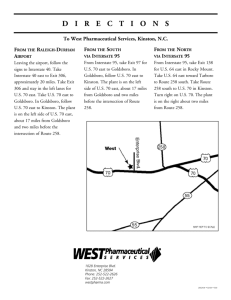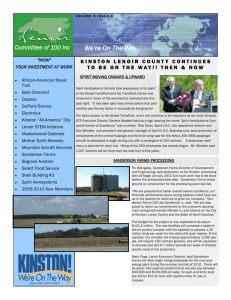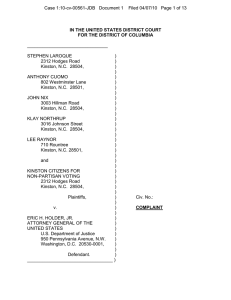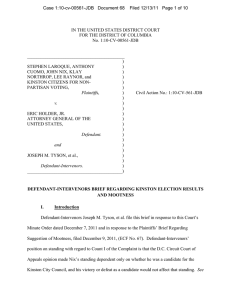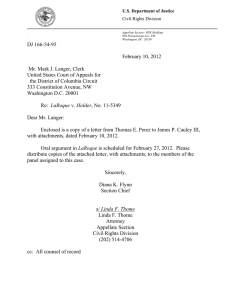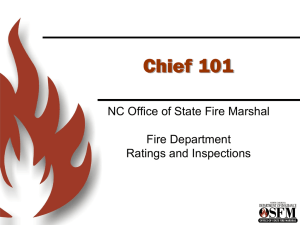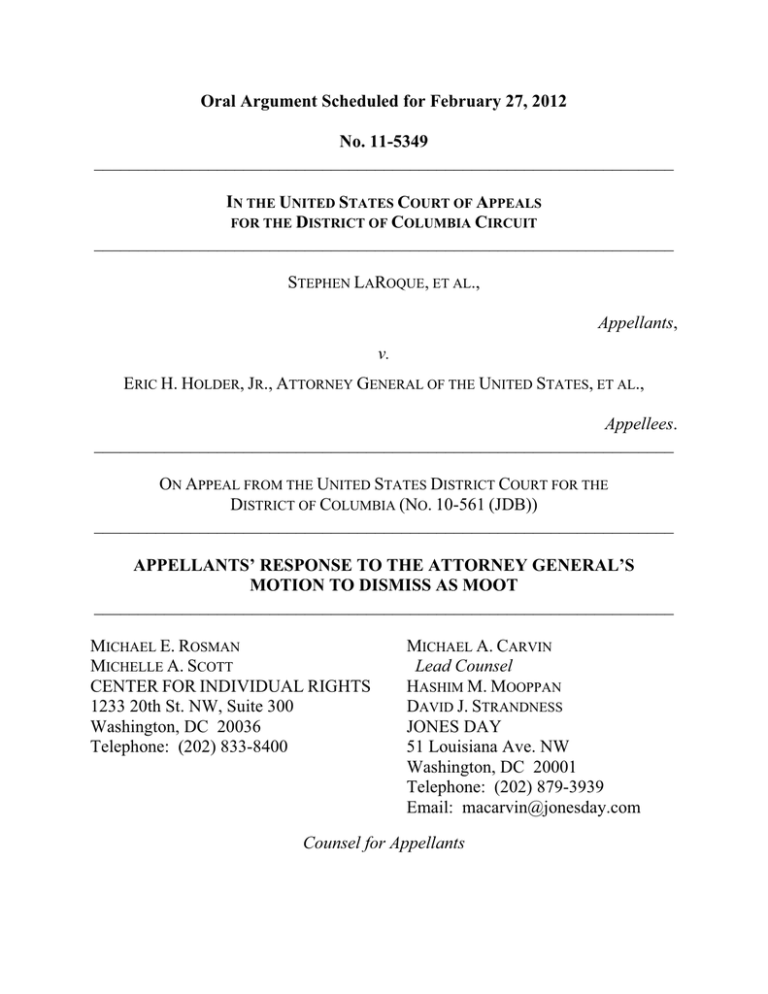
Oral Argument Scheduled for February 27, 2012
No. 11-5349
__________________________________________________________________
IN THE UNITED STATES COURT OF APPEALS
FOR THE DISTRICT OF COLUMBIA CIRCUIT
__________________________________________________________________
STEPHEN LAROQUE, ET AL.,
Appellants,
v.
ERIC H. HOLDER, JR., ATTORNEY GENERAL OF THE UNITED STATES, ET AL.,
Appellees.
__________________________________________________________________
ON APPEAL FROM THE UNITED STATES DISTRICT COURT FOR THE
DISTRICT OF COLUMBIA (NO. 10-561 (JDB))
__________________________________________________________________
APPELLANTS’ RESPONSE TO THE ATTORNEY GENERAL’S
MOTION TO DISMISS AS MOOT
__________________________________________________________________
MICHAEL E. ROSMAN
MICHELLE A. SCOTT
CENTER FOR INDIVIDUAL RIGHTS
1233 20th St. NW, Suite 300
Washington, DC 20036
Telephone: (202) 833-8400
MICHAEL A. CARVIN
Lead Counsel
HASHIM M. MOOPPAN
DAVID J. STRANDNESS
JONES DAY
51 Louisiana Ave. NW
Washington, DC 20001
Telephone: (202) 879-3939
Email: macarvin@jonesday.com
Counsel for Appellants
AMENDMENT TO CERTIFICATE AS TO PARTIES
After Plaintiffs-Appellants filed their opening brief, Plaintiff Klay Northrup
moved out of Kinston, North Carolina, for occupational reasons. Accordingly,
Northrup should no longer be treated as a party to this appeal. Northrup did not,
however, present any unique legal claims or injuries, so his withdrawal from this
suit has no effect on this Court’s ability to adjudicate this appeal.
i
TABLE OF CONTENTS
Page
AMENDMENT TO CERTIFICATE AS TO PARTIES ...........................................i
TABLE OF AUTHORITIES .................................................................................. iii
INTRODUCTION ....................................................................................................1
ARGUMENT ............................................................................................................2
CONCLUSION .......................................................................................................10
CERTIFICATE OF SERVICE
ATTACHMENT A (DECLARATION OF STEPHEN LAROQUE)
ii
TABLE OF AUTHORITIES
Page(s)
CASES
*Adarand Constructors, Inc. v. Slater,
528 U.S. 216 (2000) ......................................................................................5, 6, 8
Allen v. State Bd. of Elections,
393 U.S. 544 (1969) .............................................................................................. 5
*City of New York v. Baker,
878 F.2d 507 (D.C. Cir. 1989) .......................................................................... 6, 7
*Cnty. of Los Angeles v. Davis,
440 U.S. 625 (1979) ........................................................................................3, 10
Dynalantic Corp. v. Dept’ of Defense,
115 F.3d 1012 (D.C. Cir. 1997) .......................................................................... 10
*Friends of the Earth, Inc. v. Laidlaw Environmental Servs. (TOC), Inc.,
528 U.S. 167 (2000) ....................................................................2, 3, 4, 5, 6, 8, 10
Harris v. Bell,
562 F.2d 772 (D.C. Cir. 1977) .......................................................................... 4, 5
Harris v. Levi,
416 F. Supp. 208 (D.D.C. 1976) ........................................................................... 4
In re Protest of Atchison,
666 S.E.2d 209 (N.C. Ct. App. 2008) ................................................................. 10
*Legal Assistance for Vietnamese Asylum Seekers v. Dep’t of State,
74 F.3d 1308 (D.C. Cir. 1996) ......................................................................6, 7, 8
Morris v. Gressette,
432 U.S. 491 (1977) .............................................................................................. 5
Ne. Fla. Chapter of the Asssoc. Gen. Contractors of Am. v.
City of Jacksonville,
508 U.S. 656 (1993) .............................................................................................. 9
* Authorities upon which we chiefly rely are marked with asterisks.
iii
Russello v. United States,
464 U.S. 16 (1983) ................................................................................................ 4
United States v. Hays,
515 U.S. 737 (1995) .............................................................................................. 9
United States v. Onslow Cnty.,
683 F. Supp. 1021 (E.D.N.C. 1988) ................................................................... 10
United States v. W.T. Grant Co.,
345 U.S. 629 (1953) .............................................................................................. 2
Utah v. Evans,
536 U.S. 452 (2002) ............................................................................................ 10
STATUTES
42 U.S.C. § 1973c(a) .............................................................................................. 3, 4
N.C.G.S. § 163-182.13(a)(4) ................................................................................... 10
OTHER AUTHORITIES
28 C.F.R. § 51.46(a)................................................................................................... 4
2/10/12 Perez Letter ................................................................................................... 1
8/17/09 King Letter ................................................................................................ 1, 4
iv
INTRODUCTION
After Section 5 suspended Kinston’s nonpartisan-elections referendum and
the Attorney General denied preclearance by objecting, Plaintiffs-Appellants have
spent nearly two years litigating this facial constitutional challenge to Section 5.
JA 222-24.
Now, however, just days before its briefing deadline and oral
argument, DOJ claims sua sponte to have “reconsidered” and “withdr[awn]” its
objection. See AG Motion at 2-4. By thus trying to moot Plaintiffs’ unique and
significant arguments that the 2006 amendments facially invalidate Section 5, DOJ
is engaged in a desperate, brazen, and outrageous effort to manipulate the scope of
this Panel’s already-pending review of Section 5’s facial constitutionality.
To be sure, DOJ portrays its abrupt reversal as “[p]rompted” by an innocent
discovery of “a substantial change in operative fact.” See AG Motion at 2-4. But
that pretext is as transparent as it is implausible. 1 Indeed, Plaintiffs challenge DOJ
1
Although DOJ emphasizes that blacks were “a majority of the electorate” in 2011
and had unprecedented success under the partisan election held last year, it does
not quantify the size of the majority, let alone demonstrate that the majority was
sufficiently large or cohesive that the black-preferred candidates could or would
have won without the “crossover voting by whites” that DOJ previously claimed
was “critical.” Compare 2/12/10 Perez Letter at 2, with 8/17/09 King Letter at 1.
This glaring omission is unsurprising, since the electoral data in 2012 is materially
indistinguishable from the data in 2009. Compare id. (in 2008, blacks were an
estimated 66.6% of total population and 64.6% of registered voters, yet a minority
of actual voters in 3 of the past 4 general elections and maybe a “slight” majority
in the fourth), with 2/12/10 Perez Letter at 2 (in 2011, blacks were 65.0% of
voting-age population and 65.4% of registered voters, yet were (apparently) a
minority of actual voters in 2009 and an (unquantified) majority in 2011).
1
to represent to this Court that the pendency of this appeal played no role in its
decision-making concerning its purported “withdrawal” of the objection.
In all events, as explained below, defendants who self-servingly assert that
their voluntary conduct has mooted a previously live case face a heavy burden:
they must prove that (1) it is absolutely clear that judicial relief is not reasonably
needed to prevent the alleged violation from injuring plaintiffs in the future, and
(2) judicial relief is not likely capable of redressing the effects of the past alleged
violation. Yet DOJ cannot disprove the reasonable likelihood of at least three
possible injuries, any one of which keeps this facial challenge alive:
I.
Section 5 will continue to injure Nix by forcing him to run in a
partisan election in 2013, because DOJ’s “withdrawal” of its objection
is unauthorized and ineffectual.
II.
Section 5 will injure Nix in the 2013 election by suspending another
beneficial voting change in Kinston, especially given certain voting
changes that may soon occur.
III.
Section 5’s invalidation will redress Nix’s injury from the 2011
election, by enabling North Carolina officials or judges to order a new
election under the nonpartisan referendum.
ARGUMENT
“The only conceivable basis for a finding of mootness in this case is [DOJ’s]
voluntary conduct” in purporting to “withdraw” its objection to Kinston’s
referendum. Friends of the Earth, Inc. v. Laidlaw Environmental Servs. (TOC),
Inc., 528 U.S. 167, 189 (2000). But the Supreme Court, “rightly refus[ing] to grant
defendants such a powerful weapon against public law enforcement,” United States
2
v. W.T. Grant Co., 345 U.S. 629, 632 (1953), has adopted a “stringent” standard
“for determining whether a case has been mooted by the defendant’s voluntary
conduct,” Laidlaw, 528 U.S. at 189. Namely, the defendant bears the “heavy
burden” of proving that (1) it is “absolutely clear” that its “allegedly wrongful
behavior could not reasonably be expected” to injure the plaintiff in the future, and
(2) the “effects of the [past] alleged violation” “have [been] completely and
irrevocably eradicated” to the extent feasible. See id. at 189-90; Cnty. of Los
Angeles v. Davis, 440 U.S. 625, 631 (1979). DOJ ignores this settled standard.
See AG Memo. at 4-9. As noted, DOJ fails to meet its burden for three reasons.
I.
DOJ assumes that it granted “preclearance” to the referendum by
purporting to “withdraw[]” its objection after sua sponte “reconsideration.” See
AG Motion at 2-5. But that assumption is legally mistaken. DOJ’s “withdrawal”
is ultra vires, and its validity simply cannot be decided conclusively here.
Section 5 generally bars the implementation of a voting change “unless and
until” the D.C. district “court enters [a] judgment” awarding judicial preclearance.
42 U.S.C. § 1973c(a). Under the lone administrative preclearance exception, a
change can be implemented “without [a judicial] proceeding if [it] has been
submitted by the [covered jurisdiction] to the Attorney General and [he] has not
interposed an objection within sixty days after such submission, or … has
affirmatively indicated that such objection will not be made.”
3
Id. (emphases
added). But that exception is unavailable here, as DOJ did “interpose an objection
within sixty days” of Kinston’s final “submission,” see 8/17/09 King Letter at 1,
which means that Section 5’s plain text continues to bar the referendum.
Critically, Section 5 never authorizes DOJ to “reconsider” or “withdraw” an
objection denying preclearance. Compare 42 U.S.C. § 1973c(a), with 28 C.F.R.
§ 51.46(a).
Moreover, it omits that authority even while expressly including
authority for DOJ “to reexamine” a prior “affirmative indication” that it would be
granting preclearance, so long as that reexamination occurs “during the … sixtyday period.” 42 U.S.C. § 1973c(a). This “disparate” treatment of reexamination
authority must be “presumed” to be “intentional[] and purpose[ful].” See Russello
v. United States, 464 U.S. 16, 23 (1983). Indeed, Congress had good reason to
deny DOJ sua sponte authority to revisit long-final objections: that power would
seriously exacerbate the electoral uncertainty created by Section 5. 2
Accordingly, DOJ cannot possibly meet its “heavy burden” of proving that it
is “absolutely clear” that Nix’s injuries from partisan elections are not “reasonably
2
Of course, nothing in Section 5’s text precludes a new “submission” of a
previously-submitted change, thereby restarting the 60-day clock and enabling
preclearance if DOJ accepts the re-submission. See 42 U.S.C. § 1973c(a). But that
has no relevance here, since DOJ acted sua sponte. It is, however, essentially what
occurred in Harris v. Levi, 416 F. Supp. 208, 209 (D.D.C. 1976). To the extent the
district court there more broadly suggested that DOJ has “implied” “power to
revoke objections,” see id. at 211, that statement was dicta, flatly irreconcilable
with the statutory text, and explicitly not appealed to this Court, see Harris v. Bell,
562 F.2d 772, 773-74 (D.C. Cir. 1977) (per curiam).
4
[likely] to recur” in 2013. See Laidlaw, 528 U.S. at 189; see also Adarand
Constructors, Inc. v. Slater, 528 U.S. 216, 221-24 (2000) (per curiam) (challenge
to a racially-preferential federal program was not mooted when a state certified
that the white plaintiff should receive the preference, because the federal defendant
had not proved that it would accept that strange certification). DOJ has not even
proved that Kinston will try to implement the referendum based on the ultra vires
“withdrawal” of the objection. Moreover, were the City to do so, voters in Kinston
who doubt DOJ’s pretextual analysis or otherwise oppose nonpartisan elections
could sue in North Carolina federal court to enjoin the implementation due to the
lack of preclearance. Allen v. State Bd. of Elections, 393 U.S. 544, 554-60 (1969).
Neither DOJ nor this Court can predict—let alone be reasonably certain—whether
a future Allen court would reject the “withdrawal” as void or uphold it as valid.
DOJ tries to evade this problem by claiming that its “withdrawal” is not
subject to judicial review. See AG Br. at 7 n.4. That is doubly wrong. As a
threshold matter, a future Allen suit would not be challenging “the Attorney
General’s exercise of discretion under § 5, or his failure to object within the
statutory period.”
Compare Morris v. Gressette, 432 U.S. 491, 507 (1977).
Rather, it would be arguing that the Attorney General validly “object[ed] within the
statutory period” and has no “discretion” to reconsider, id., making its withdrawal
ultra vires. Cf. Harris, 562 F.2d at 773-74 (repeatedly emphasizing that a similar
5
argument was decided on the merits below and was not appealed).
More
fundamentally, DOJ cannot possibly prove to this Court now that it is absolutely
clear that there is no reasonable likelihood that a future Allen court will hold
Morris inapplicable and the “withdrawal” void. See Adarand, 528 U.S. at 221-24.
II.
In any event, this is not an as-applied challenge to the referendum’s
suspension, but a facial constitutional challenge to Section 5. See JA 13-15, 222,
233; Pltfs. Br. 5-6. As the “allegedly wrongful behavior” is thus the preclearance
statute, DOJ cannot conceivably satisfy its “heavy burden” of proving that it is
“absolutely clear” that the “challenged conduct” cannot “reasonably be expected”
to injure Nix during the 2013 election cycle. See Laidlaw, 528 U.S. at 189-90.
At most, “the government has merely con[tended]” that the referendum is no
longer suspended “under [Section 5] for the reasons [specifically] advanced” here,
while retaining its “free[dom] to reassert its [general] position” that Section 5 is
facially valid in possible future situations where the suspension of other voting
changes will again injure Nix. See City of New York v. Baker, 878 F.2d 507, 51112 (D.C. Cir. 1989). Yet “the government cannot escape the pitfalls of litigation
by simply giving in to a plaintiff’s individual claim without renouncing the
challenged policy,” unless it proves that there is no “reasonable chance of the
dispute arising again between the government and the same plaintiff.” See Legal
Assistance for Vietnamese Asylum Seekers v. Dep’t of State, 74 F.3d 1308, 1311
6
(D.C. Cir. 1996) (“LAVAS”), vacated on other grounds, 519 U.S. 1 (1996).
For example, in New York, the State Department denied a visa application
for an Italian official to address a peace rally, on the ground that allowing his mere
entry into the country would be harmful to foreign affairs due to his membership in
a disfavored organization. 878 F.2d at 508, 511. The Italian’s visa sponsors sued,
claiming that the relevant statute authorized visa denials only based on the
applicant’s expected domestic “activity,” not based on his “mere entry” due to his
extraterritorial conduct. Id. at 508. Roughly five years later, the Government
moved to dismiss the case as moot. Although it still “ha[d] not renounced” “its
[general] position” that visa denials can be based on harm from “mere entry,” it
argued that it no longer specifically applied that policy to deny visas where—as in
the case of the Italian—the harm flowed from extraterritorial conduct that
otherwise would be protected by the First Amendment. See id. at 511. This Court
rejected that argument, invoking the “well settled” rule “that voluntary cessation of
a challenged practice does not in and of itself moot a case when the party could
renew it.” Id. at 511-12. The case remained live because “the State Department
would be free to reassert” its general policy of denying visas based on harm from
“mere entry” “if [the Italian] filed a new visa application.” Id. (emphasis added).
Likewise, in LAVAS, a visa applicant challenged the State Department’s
policy of refusing to process Vietnamese applications in Hong Kong. 74 F.3d at
7
1310. The Government argued that “the case ha[d] been mooted by its tender of
the relief requested” when it “process[ed]” (and initially denied) “her [particular]
application in Hong Kong.” Id. at 1309-10. But this Court held that “[t]he State
Department … [could not] show that it [was] ‘absolutely clear that the allegedly
wrongful behavior could not reasonably be expected to recur,’” because it retained
its “policy of refusing to process [such] applications … in Hong Kong,” and she
“would presumably be free to file another [one].” Id. at 1311 (emphasis added).
DOJ thus fundamentally errs in arguing that Plaintiffs must now establish
“standing to bring … a forward-looking challenge” to Section 5 based on future
injurious applications that are not “conjectural [or] hypothetical.” See AG Motion
at 7-8.
The cases cited by DOJ did not involve mootness caused by the
defendant’s voluntary conduct, see id., and thus DOJ is “plac[ing] the burden of
proof on the wrong party.” Adarand, 528 U.S. at 221-22. “The plain lesson of [the
voluntary cessation] cases is that there are circumstances in which the prospect that
a defendant will engage in (or resume) harmful conduct may be too speculative to
support standing, but not too speculative to overcome mootness.” Laidlaw, 528
U.S. at 190; see also Adarand, 528 U.S. at 223-24 (summarily reversing for failure
to heed this lesson). Notably, this Court held that New York and LAVAS were not
moot based on the mere possibility that the individuals there could file future visa
applications, not the concrete likelihood that they would.
8
Here, DOJ cannot plausibly show that it is absolutely clear that Section 5 is
not reasonably likely to injure Plaintiffs again.
Most obviously, preclearance
might well be denied for any one of numerous voting changes that would benefit
Nix in the 2013 election.
Indeed, as Representative LaRoque explains in an
attached declaration, there are at least three potential changes that might well soon
require preclearance: a change by the Kinston City Council to switch to districtbased elections from at-large elections, a change by the North Carolina Legislature
to mandate the use of at-large elections in Kinston, and another change by the
Legislature to impose a “voter ID” requirement in Lenoir County. See Attachment
A at ¶¶ 3-7. Depending on precisely how they would be implemented, any of these
changes could be reasonably likely to benefit Nix but draw an objection.
Moreover, wholly apart from Nix, future applications of Section 5’s
amended standard to voting changes for elections held in Kinston will injure
Plaintiffs by denying them “equal treatment” as white voters: both by imposing a
racially-preferential “barrier” to “obtain[ing] [the] benefit” of enactment of their
preferred changes, see Ne. Fla. Chapter of the Asssoc. Gen. Contractors of Am. v.
City of Jacksonville, 508 U.S. 656, 666 (1993), and by imposing a “stigmati[c]”
“racial classification” that “solely … effectuate[s]” the interests of black voters,
see United States v. Hays, 515 U.S. 737, 744-45 (1995). The district court rejected
these “equal treatment” injuries just because whites and blacks do not have 100%
9
racially polarized support for any given change, see JA 295-300, but the critical
fact is that the sole function of the amended standard is to benefit minorities. 3
III.
Finally, facially invalidating Section 5 may well “eradicate[]” one of
“the effects of the alleged violation.” See Davis, 440 U.S. at 631. Nix would have
a strong argument that the Board of Elections should “order a new election”
because the erroneous use of the partisan system in 2011 was an “[i]rregularit[y] or
impropriet[y]” that “taint[ed] the results of the entire election and cast doubt on its
fairness.” N.C.G.S. § 163-182.13(a)(4). 4 Invalidating Section 5 thus would be a
judicially-ordered “change in a legal status” where “the practical consequence of
that change would amount to a significant increase in the likelihood that [Nix]
would obtain relief that directly redresses the injury suffered.” Utah v. Evans, 536
U.S. 452, 464 (2002). Given that Utah upheld standing for that reason, DOJ
certainly cannot satisfy its mootness burden of disproving the reasonable likelihood
of such relief. See Davis, 440 U.S. at 625; Laidlaw, 528 U.S. at 189-90.
CONCLUSION
This Court should deny the Attorney General’s motion to dismiss as moot.
3
Although Appellants did not challenge the district court’s error in their opening
brief, “the government’s switch of position” justifies raising the issue now. See
Dynalantic Corp. v. Dept’ of Defense, 115 F.3d 1012, 1015 (D.C. Cir. 1997).
4
See also In re Protest of Atchison, 666 S.E.2d 209, 211-12 (N.C. Ct. App. 2008)
(ordering a broader election than had the Board); cf. United States v. Onslow Cnty.,
683 F. Supp. 1021, 1023-24 (E.D.N.C. 1988) (“This court certainly has the power
to order an election in conformity with constitutional and legislative principles.”).
10
February 21, 2012
Respectfully submitted
MICHAEL E. ROSMAN
MICHELLE A. SCOTT
CENTER FOR INDIVIDUAL RIGHTS
1233 20th St. NW, Suite 300
Washington, DC 20036
Telephone: (202) 833-8400
/s/ Michael A. Carvin
MICHAEL A. CARVIN
Lead Counsel
HASHIM M. MOOPPAN
DAVID J. STRANDNESS
JONES DAY
51 Louisiana Ave. NW
Washington, DC 20001
Telephone: (202) 879-3939
Email: macarvin@jonesday.com
Counsel for Appellants
CERTIFICATE OF SERVICE
I hereby certify that, on February 21, 2012, I caused four copies of the
foregoing document to be filed with the clerk of this Court by hand delivery, and I
electronically filed the original of the foregoing document with the clerk of this
Court by using the CM/ECF system, which will serve the following counsel for
Appellees at their designated electronic mail addresses:
Diana K. Flynn (Diana.K.Flynn@usdoj.gov)
Linda F. Thome (linda.thome@usdoj.gov)
Sarah E. Harrington (sarah.harrington@usdoj.gov)
Counsel for Defendant-Appellee
J. Gerald Hebert (ghebert@campaignlegalcenter.org)
Arthur B. Spitzer (artspitzer@gmail.com)
Counsel for Intervenor-Appellees
February 21, 2012
/s/ Michael A. Carvin
MICHAEL A. CARVIN
Counsel for Appellants
Attachment A
Exhibit 1
City of Kinston - City Council
Page 1 of 1
City Council
City Council
Kelly Jarman, Robert A. Swinson IV, Mayor BJ Murphy, Mayor Pro Tem Joseph Tyson, Bobby Merritt and Sammy C. Aiken
The City Council of Kinston is comprised of five Council members and the Mayor. The Council members and Mayor are elected
to four year, staggered terms - meaning they don't all come up for re-election at once. They are elected "at-large" and they
represent everyone in the city, as opposed to residents in certain districts. The Mayor is the chairman of the City Council, and
leads all meetings of the Council. The Mayor is not, however, a voting member of the board, but may vote to break a tie, which
is rare. When the Mayor is absent, the Mayor Pro Tem leads meetings. The Mayor Pro Tem is appointed by the Mayor and is
always an elected City Council member.
The City Council meets in regular session in the City Council Chambers at City Hall on the first and third Mondays of each
month at 7 pm. The meetings are broadcast live on Government Access Channel 2, and replayed at 10 am, 7 pm and Midnight
daily.
The City Council holds a work session on the third Monday of each month at 5:30 pm in the City Council Chambers at City Hall.
All City Council meetings, except those designated as Closed Sessions, are open to the public. Residents are encouraged to
attend.
The City Council appoints the City Manager, the City Attorney, and the City Clerk.
The City Attorney acts as legal counsel for the City.
The City Manager oversees the City staff and day to day operations of the City.
The City Clerk is the custodian of all the official records for the City and serves as liaison between the Mayor/City Council and
the public. Persons wishing to reach the Mayor, or a member of the City Council, should contact the City Clerk by telephone at
252-939-3115 or by email at christina.alphin@ci.kinston.nc.us .
Close Window
http://www.ci.kinston.nc.us/index2.php?option=com_content&task=view&id=13&pop=1...
2/17/2012
Print Article: Sammy Aiken: ‘Kinston, we can do better’
Page 1 of 2
Sammy Aiken: ‘Kinston, we can do better’
David Anderson
2011-08-20 16:42:05
aiken-sammy
After generations of Americans have fought and died for the right to
vote, Kinston City Council candidate Sammy C. Aiken is urging
today’s Kinstonians to exercise that right.
“Whoever you vote for, use your right to vote,” he said. “People have
died for you to vote; Kinston, we can do better, we can do much
better.”
Aiken’s main goal, should he get on the City Council, is to improve
the quality of life in a city he has called home for more than 20 years.
“I’d like to see the quality of life for the citizens of Kinston improved,”
he said. “When you say quality of life: school system, jobs, just the
appearance of Kinston; people drive in, they want to see the city
more beautified.”
Aiken said that, to combat crime in the city, it is critical to have
greater community involvement and strong families; also area nonprofits and churches must combine
resources to fight the ills of society.
To reduce spending, he would look into combining some city and county departments, and privatizing
certain city services.
To bring down electric bills, Aiken would encourage placing green energy sources, such as solar panels,
on buildings, and even have certain companies convert to making such panels.
He said he was in favor of nonpartisan elections — as long as districts and wards are created — since it
costs so much to put on a primary election that typically sees low turnout among local voters.
Aiken said he was “ambivalent” about involuntary annexation — he did not want to forcibly annex people
who do not want to be in the city, but he said they are still using city facilities without directly paying for
them.
David Anderson can be reached at 252-559-1077 or danderson@freedomenc.com.
Breakout:
To listen to the full podcast click on the candidates name and for Free Press Reporter David Anderson's
profile click on the Kinston.com link.
http://www.kinston.com/common/printer/view.php?db=kfpress&id=75745
2/17/2012
Print Article: Sammy Aiken: ‘Kinston, we can do better’
Page 2 of 2
Sammy Aiken
William Cooke: http://www.kinston.com/articles/william-75746-cooke-front.html
Ronnie Isler: http://www.kinston.com/articles/city-75747-ronnie-isler.html
Kelly Jarman: http://www.kinston.com/articles/jarman-75748-kelly-market.html
Joe Plasky: http://www.kinston.com/articles/voters-75749-joe-plasky.html
Joe Tyson: http://www.kinston.com/articles/work-75750-tyson-joe.html
© Copyright 2012 Freedom Communications. All Rights Reserved.
Privacy Policy | User Agreement | Site Map
http://www.kinston.com/common/printer/view.php?db=kfpress&id=75745
2/17/2012
Print Article: Kelly Jarman: ‘Market the great things we have going on.’
Page 1 of 2
Kelly Jarman: ‘Market the great things we have going on.’
David Anderson
2011-08-20 16:45:56
kelly-jarman
Kelly Jarman has lived in Kinston for 28 years, raised her family here,
and said she is running for City Council to give back.
“The city has been good to me and my family, and by running for City
Council, I felt like it was a good opportunity to give back to my city,”
she said.
Jarman’s main goal, should she get on the City Council, would be to
promote the positive things that have happened in Kinston in recent
years.
“I just want to market the great things we have going on, so when
people move to this area they will want to buy or rent a house in the
city so they will have access to all these services,” she said.
Jarman acknowledged the city must continue to progress, though. In
order to fight crime, she encouraged citizens to work together with
the police, citing a successful program in another community in which seniors worked hand-in-hand with
police to spot crimes.
Regarding city spending, Jarman said she did not want to lay off any more employees, and did not want to
cut services citizens count on. She said city employees can do many small things, such as turning off
lights when not in use, to save money.
She said residents’ electric bills will not come down until ElectriCities’ debt is paid off. She does not expect
Progress Energy or Duke Energy to buy the public assets “when their debts outweigh their assets.”
Jarman also supports nonpartisan elections as long as districts and wards are created in the city. She said
districts will ensure minority representation.
She said she is qualified to be a City Council member because she lives in the city, has worked with
budgets, interacted with business and industry, and she plans to listen to residents and show evidence
she is working to address their needs.
David Anderson can be reached at 252-559-1077 or danderson@freedomenc.com.
To listen to the full podcast click on the candidates name and for Free Press Reporter David Anderson's
profile click on the Kinston.com link.
http://www.kinston.com/common/printer/view.php?db=kfpress&id=75748
2/17/2012
Print Article: Kelly Jarman: ‘Market the great things we have going on.’
Page 2 of 2
Kelly Jarman
Sammy Aiken: http://www.kinston.com/articles/kinston-75745-aiken-sammy.html
William Cooke: http://www.kinston.com/articles/william-75746-cooke-front.html
Ronnie Isler: http://www.kinston.com/articles/city-75747-ronnie-isler.html
Joe Plasky: http://www.kinston.com/articles/voters-75749-joe-plasky.html
Joe Tyson: http://www.kinston.com/articles/work-75750-tyson-joe.html
© Copyright 2012 Freedom Communications. All Rights Reserved.
Privacy Policy | User Agreement | Site Map
http://www.kinston.com/common/printer/view.php?db=kfpress&id=75748
2/17/2012
Print Article: Joe Tyson: ‘Here to work with any and everyone’
Page 1 of 2
Joe Tyson: ‘Here to work with any and everyone’
David Anderson
2011-08-20 16:48:00
joe-tyson
Joe Tyson is willing to work with any citizen of Kinston in order to
tackle the multiple issues currently facing the city.
“I’m concerned about the whole city of Kinston, not just one section
of the city of Kinston, not just one group of people,” he said. “I’m here
to work with any and everyone.”
Tyson has lived in Kinston for 18 years and is the lone incumbent
running. His main goal, should he be returned to the City Council,
would be to increase citizen involvement in improving Kinston’s
quality of life.
“I’m going to spend that time trying to my best to get the citizens of
Kinston — all of the citizens of Kinston — more involved in what’s
going on in the city,” he said.
Tyson said citizen involvement is critical to fighting crime. The police,
citizens and community groups must come together, and he plans to tell citizens: “This is your city.”
Regarding city spending, Tyson said he did not think the city is spending enough; he noted the city’s
workforce has been cut by about 50 percent over the years, and there were very few city services that
could be reduced or eliminated without angering citizens.
He said the only way to reduce electric bills would be to get out of the electric business, and sell off assets
in about 10 years, once more of the debt is retired.
Tyson also supports nonpartisan voting, if districts and wards are created to ensure the entire city is
represented on the council.
He said the perception of Kinston’s crime and Lenoir County’s school system must change if new
business is to come to the area. That can be done by reducing crime, rebuilding the city and working with
the school board to change the perception of public schools.
David Anderson can be reached at 252-559-1077 or danderson@freedomenc.com.
To listen to the full podcast click on the candidates name and for Free Press Reporter David Anderson's
profile click on the Kinston.com link.
Joe Tyson
http://www.kinston.com/common/printer/view.php?db=kfpress&id=75750
2/17/2012
Print Article: Joe Tyson: ‘Here to work with any and everyone’
Page 2 of 2
Sammy Aiken: http://www.kinston.com/articles/kinston-75745-aiken-sammy.html
William Cooke: http://www.kinston.com/articles/william-75746-cooke-front.html
Ronnie Isler: http://www.kinston.com/articles/city-75747-ronnie-isler.html
Kelly Jarman: http://www.kinston.com/articles/jarman-75748-kelly-market.html
Joe Plasky: http://www.kinston.com/articles/voters-75749-joe-plasky.html
© Copyright 2012 Freedom Communications. All Rights Reserved.
Privacy Policy | User Agreement | Site Map
http://www.kinston.com/common/printer/view.php?db=kfpress&id=75750
2/17/2012


